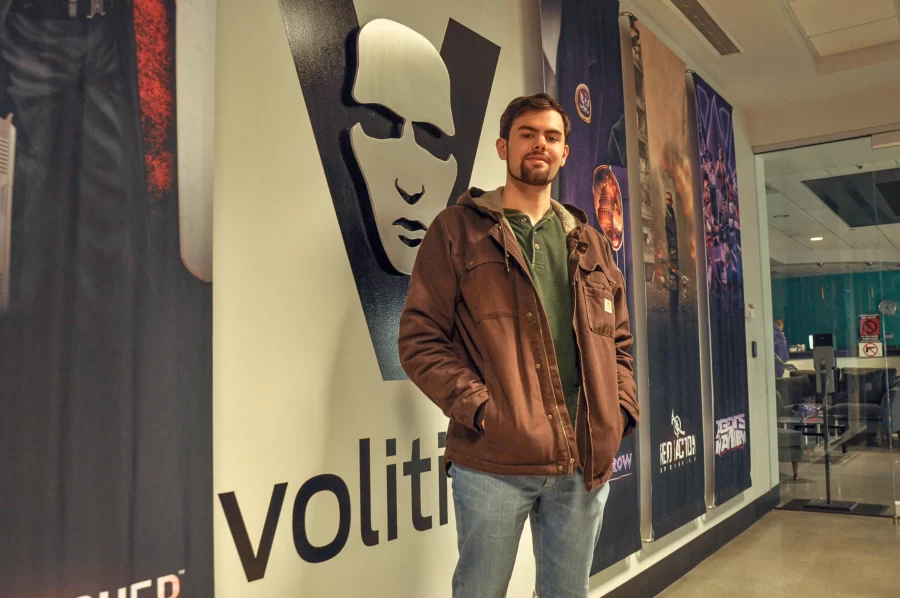The artist who turns fruit into fistfights
Trevor Burke poses at the entrance of Volition’s lobby in downtown Champaign on Oct. 18. Burke works as a sound designer for the video game company.
Oct 24, 2022
Trevor Burke walks into a grocery store and picks out various fruits and vegetables. Then, back in his room, he smashes a fresh watermelon with a hammer in front of a microphone covered with a towel. As the desk gets messy, Burke knows he’s made another masterpiece.
Burke is a sound designer at Deep Silver Volition, a video game studio in downtown Champaign. He uses produce to design sounds for Volition’s line of action and shooter games — ripping bell peppers for a punch, cracking celery for broken bones and squeezing grapefruit for the sound of blood.
“It’s stupid sometimes,” Burke said. “What you have to do to get sound is sometimes nonsensical and not what you’d expect.”
Burke found his passion for music production in middle school. Unlike his peers, eager to express themselves through electronic music, he decided to pursue “the science of sound.” Burke added that he has more fun solving problems when building a specific sound with his music knowledge.
“It’s the same reason why somebody would enjoy math or more scientific (kinds) of things, where it’s a bit clearer in its path with definite answers,” Burke said.
Get The Daily Illini in your inbox!
As an avid gamer, Burke said his interest in shooter games led him into the industry. He explained that a microphone could not capture a satisfying sound when recording a gunshot in a field.
Burke described how he breaks a gunshot sound effect down into several parts: instant-moment sounds that are called transients, consistent sounds that are called the body, mechanical sounds and a kick drum base layer. He then uses an assortment of Tupperware containers, fireworks, wrenches and tiny bags of nails to imitate the different sounds and combines them to create a realistic gunshot sound.
“The funniest part is what you are adding to that gunshot to make it sound more satisfying and more specific is completely up to you,” Burke said. “Use almost anything on anything if you know how to process it or blend it in the right way.”
Burke said he believes sound is a massive delivery of emotion, and most people don’t realize the significant appeal of sound. He said he knows that quality sound design involves over a million different behind-the-scenes techniques, filling up a frequency space and creating a more fluid process.
“Maybe I add a little bit more bass in the chest thump when you fire the gun,” Burke said. “Fits it more, I like it more. In the context of the game, better sound is what makes you stand out.”
For Burke, building the sound of a vehicle can take up to an entire week. Unlike movies where the sound of the engine accompanies pre-recorded footage, video games need to ensure that every sound fits the player’s actions.
As the player hits the brakes, sound designers turn down the volume of the engine and raise the brake screech. To figure out how the vehicle’s traction impacts the functional sound of the brake, Burke said he has to collect data on the cars and experiment with different sounds.
“There was a lot of complicated effort that goes at the end of that process of implementing it into the game,” Burke said.
Although the designed sounds have to conform to their functional roles, Burke said he sees creativity in his job. He gradually figured out his preferred nuances among audio software plug-ins and compared his work on the audio workstation to musicians’ performance on guitar pedals.
“The building blocks are the same, and it’s more about how you apply it and how creative you can get,” Burke said.
Burke also works on otherworldly sounds for more fictional worlds. Burke said he had to use his imagination when creating the sound of a fireball. He first hears the sound in his head and then tries to think of real-life techniques and objects that could bring it to life, such as dry ice and seltzer.
“If you get 10 people to do 10 sound designs, they’re all going to come up with different sounds, and that’s the self-expression,” Burke said. “It’s just how can I get something where I see it and say, ‘Yeah, that sounds good. I liked that.’”
Burke said that since many studios want an individual to take on all roles in the process of video game sound design, he encourages students who wish to pursue a career in this field to obtain a “whole spectrum of skills” from recording to programming.
“Try to learn the entire process instead of just saying, ‘I’m a sound designer; (that’s) only what I’m going to do. You’re gonna have to hire me if you want me to (do) sound design, nothing else,’” Burke said. “It doesn’t work like that.”
Despite the competitive job market, Burke said the sound design industry has been enlightening professionals with plenty of fun and that people are usually happy with their work.
“It is genuinely just a bunch of dweeb nerds who just love learning about it and love focusing on it since it’s so creative, entertaining and, most of the time, (there’s) a lot of passion,” Burke said.






